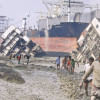Shipbreaking yards or graves for workers?

In a country where labour rights are often ignored and violated by the owners of different industries, it comes as no surprise that workers in our shipbreaking yards are being forced to work in unsafe conditions, which often lead to major accidents and even deaths. According to the latest report by NGO Shipbreaking Platform, all the shipbreaking accidents that happened between July and September this year across the world—there were four of them—took place in Bangladesh. During this period, a total of 111 ships were dismantled across the world, around half of which—54, to be exact—were scrapped in Bangladesh. While this means a lot of profit for the owners, for the workers who toil from dawn to dusk in these toxic and hazardous ships, this means precious little.
In all the four accidents that occurred between July and September, the workers fell off the ships they were dismantling. While three of the workers died, one survived with leg injuries. Such sheer negligence on the owners' part regarding workers' safety is unthinkable. According to NGO Shipbreaking Platform, 249 people were killed in accidents in the shipbreaking yards in Sitakunda upazila, Chattogram between 2005 and 2022. Workers are also exposed to toxic chemicals when dismantling these end-of-life ships. Moreover, the mushrooming shipbreaking yards in Sitakunda are polluting the surrounding environment as well as the sea. While international rules say that owners must remove toxic elements from a ship before bringing it to our shore for breaking, most owners do not abide by this. Many of the shipbreaking yards also dump oil in the sea, which is also prohibited by law.
Sadly, rather than ensuring workers' safety and environmental protection, the Bangladesh Ship Breakers and Recyclers Association is reportedly putting pressure on the government to recategorise this industry from "red" to "orange," so that they are no longer required to obtain environmental impact assessments. This is ridiculous.
The shipbreaking industry is one of the most hazardous industries in the world. Therefore, the owners of this industry must abide by the existing national and international regulations to ensure environmental protection and safe ship recycling. They must also take steps to protect their workers' lives from avoidable accidents, which we should really call structural murders. There needs to be a robust overseeing mechanism from the government to ensure all this.


 For all latest news, follow The Daily Star's Google News channel.
For all latest news, follow The Daily Star's Google News channel. 









Comments